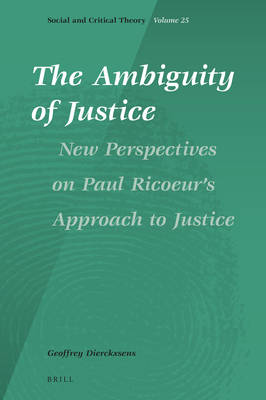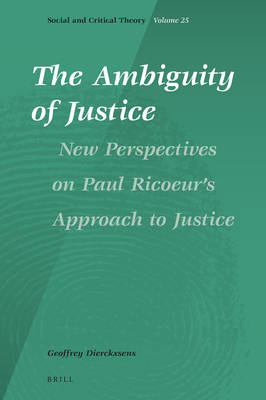
- Afhalen na 1 uur in een winkel met voorraad
- Gratis thuislevering in België vanaf € 30
- Ruim aanbod met 7 miljoen producten
- Afhalen na 1 uur in een winkel met voorraad
- Gratis thuislevering in België vanaf € 30
- Ruim aanbod met 7 miljoen producten
Zoeken
The Ambiguity of Justice: New Perspectives on Paul Ricoeur's Approach to Justice
€ 290,45
+ 580 punten
Omschrijving
The Ambiguity of Justice offers a collection of essays on Ricoeur's thought on justice, and on the different views that influenced this thought, in particular those of Arendt, Honneth, Hénaff, Rawls, Levinas and Boltanski. Although Ricoeur's idea of justice has undoubtedly caught much attention already, only a few monographs have been published so far that explicitly address this topic.
The contributors of this book - a mix of both well-established Ricoeur scholars and young promising scholars in this field - address the difficulties in Ricoeur's thought on justice by maintaining his spirit of dialogue, not only by showing how Ricoeur himself repeatedly searches for dialogue in his writings on justice, but also by arguing that Ricoeur's thought allows contributions to contemporary debates about justice.
The contributors of this book - a mix of both well-established Ricoeur scholars and young promising scholars in this field - address the difficulties in Ricoeur's thought on justice by maintaining his spirit of dialogue, not only by showing how Ricoeur himself repeatedly searches for dialogue in his writings on justice, but also by arguing that Ricoeur's thought allows contributions to contemporary debates about justice.
Specificaties
Betrokkenen
- Uitgeverij:
Inhoud
- Aantal bladzijden:
- 280
- Taal:
- Engels
- Reeks:
- Reeksnummer:
- nr. 25
Eigenschappen
- Productcode (EAN):
- 9789004427938
- Verschijningsdatum:
- 16/07/2020
- Uitvoering:
- Hardcover
- Formaat:
- Genaaid
- Afmetingen:
- 152 mm x 239 mm
- Gewicht:
- 657 g

Alleen bij Standaard Boekhandel
+ 580 punten op je klantenkaart van Standaard Boekhandel
Beoordelingen
We publiceren alleen reviews die voldoen aan de voorwaarden voor reviews. Bekijk onze voorwaarden voor reviews.







